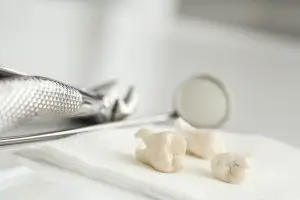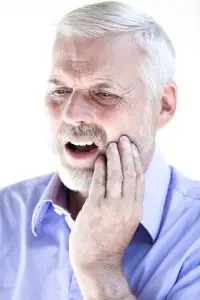There are many different situations that can play out with your teeth and gums. Some of these situations can be dental emergencies, while others may need dental care, but not be considered a true emergency. If you are experiencing what is a dental emergency, it is important to take the correct actions and act quickly. In some cases, it can be the difference between saving your tooth, and in others, it can help prevent infection and serious problems. Here are a few common dental emergencies and the steps you should take if you experience one.
A Tooth Has Fallen Out
 If a tooth has fallen out or has been knocked out, you will want to act quickly in order to help salvage the tooth. If you take the correct actions, the tooth may be able to be reattached. After losing a tooth, the first thing you should do is locate the tooth. Once you have the tooth, grab it by the tooth end, rather than the root and nerve end. If the tooth looks dirty, rinse it in clean water or milk. If possible, place the tooth back in your mouth, as close to the socket as possible. Hold it in place with gauze. This helps to keep the tooth moist and the nerves and roots healthy. If you cannot do this, place the tooth in some milk. Then head straight for your emergency dentist in Phoenix. If the tooth cannot be reattached, a dental implant may be a great option for replacing the tooth.
If a tooth has fallen out or has been knocked out, you will want to act quickly in order to help salvage the tooth. If you take the correct actions, the tooth may be able to be reattached. After losing a tooth, the first thing you should do is locate the tooth. Once you have the tooth, grab it by the tooth end, rather than the root and nerve end. If the tooth looks dirty, rinse it in clean water or milk. If possible, place the tooth back in your mouth, as close to the socket as possible. Hold it in place with gauze. This helps to keep the tooth moist and the nerves and roots healthy. If you cannot do this, place the tooth in some milk. Then head straight for your emergency dentist in Phoenix. If the tooth cannot be reattached, a dental implant may be a great option for replacing the tooth.
Your Gums Won’t Stop Bleeding
Your gums may bleed when you brush your teeth. This is most often caused by gum disease or gingivitis. If this is what you are experiencing, it is not a dental emergency. However, if you are hit in the face or have suffered some other sort of dental or facial trauma and your gums are bleeding, you may be. If your gums are bleeding, the first thing you should do is take a clean cloth and apply pressure to the affected area. It can take longer for your gums to stop bleeding than other parts of your body, such as your arms or legs. If the bleeding does not stop within 15 minutes of applying pressure, or it is heavy, you will want to go to your local emergency room or an emergency dentist in Mesa.
There is Extreme Pain
 In most cases, tooth pain is not a dental emergency. If you are experiencing tooth pain, you should attempt to use over-the-counter pain relievers and a cold compress on the side of your face. Do not use a warm compress, as warmth allows bacteria to grow faster. Also consider rinsing your mouth with a salt water rinse to kill germs and bacteria. While most cases of tooth pain are not emergencies, if you are in extreme pain that is not improving with at home treatments, especially after a dental procedure, such as a filling or root canal, you will want to make an appointment with an emergency dentist in Mesa right away.
In most cases, tooth pain is not a dental emergency. If you are experiencing tooth pain, you should attempt to use over-the-counter pain relievers and a cold compress on the side of your face. Do not use a warm compress, as warmth allows bacteria to grow faster. Also consider rinsing your mouth with a salt water rinse to kill germs and bacteria. While most cases of tooth pain are not emergencies, if you are in extreme pain that is not improving with at home treatments, especially after a dental procedure, such as a filling or root canal, you will want to make an appointment with an emergency dentist in Mesa right away.
Your Cheek, Chin or Face is Swelling
You should never ignore any swelling in your cheek, chin or face, especially if it is coupled with tooth pain and the swollen area is red and warm to the touch. This is a sign of a dental abscess. A dental abscess is an infection and should be taken very seriously. If you fail to treat a dental abscess, the infection can spread to other parts of your body, including your blood stream. Ultimately, it can cause serious problems or even lead to death.
If you are experiencing any swelling in your cheek, chin or face, notice a pimple or swollen area on your gums or have discharge coming from your tooth or gums, you need to be seen by an emergency dentist in Phoenix right away. If you cannot find or see a dentist, many doctors, urgent care clinics and emergency rooms will prescribe you antibiotics until you can be seen by your dentist. This is not something you should ever attempt to treat on your own, take lightly or wait to see if it goes away on its own.
Conclusion
If you are experiencing one of these dental emergencies, you will need to find an emergency dentist in Phoenix or Mesa, Arizona. Here at Dental Brothers, we are a leading dental practice with locations in both. We specialize in dental implants, sedation dentistry and emergency dental work. Contact us today to schedule your appointment and let us help you.
